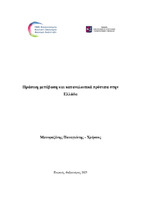Πράσινη μετάβαση και καταναλωτικά πρότυπα στην Ελλάδα
Green transition and consumption patterns in Greece

Master Thesis
Συγγραφέας
Μπουραζάνης, Παναγιώτης - Χρήστος
Ημερομηνία
2025-02Επιβλέπων
Τσελεκούνης, ΜάρκοςΠροβολή/
Λέξεις κλειδιά
ΣΒΑ/SDGs ; Πράσινη μετάβαση ; Ορυκτά καύσιμα ; Πλαστικό ; Καταναλωτική συμπεριφορά ; Κυκλική οικονομία ; Κλιματική ουδετερότητα ; Fast fashion ; Καταναλωτικά πρότυπα ; Ερωτηματολόγιο ; Κλιματική αλλαγήΠερίληψη
Η ανθρώπινη τεχνολογική εξέλιξη που λαμβάνει χώρα στον κόσμο περίπου τους δύο τελευταίους αιώνες αποτελεί ένα λαμπρό κομμάτι της ανθρώπινης ιστορίας καθώς πέρα από πολλά άλλα οδήγησε στην ευημερία του ανθρώπινου είδους. Σίγουρα ένα μεγάλο μερίδιο ευθύνης αναλογεί στα ορυκτά καύσιμα, μιας και ακόμα και σήμερα χρησιμοποιούνται για μια πληθώρα εφαρμογών όπως η παραγωγή ενέργειας, οι μεταφορές, η θέρμανση, ως πρώτη ύλη και πολλά άλλα. Παρότι υπήρχε η άποψη, ότι η χρήση των ορυκτών καυσίμων δε θα είχε μεγάλες επιπτώσεις στον πλανήτη, κάτι τέτοιο διαψεύστηκε παταγωδώς. Η χρήση των ορυκτών καυσίμων, η υπερκατανάλωση που προκλήθηκε από την μαζική αύξηση των προϊόντων και των μειωμένων τιμών και ταυτόχρονα η οικονομική ανισότητα ανάμεσα σε πλούσιες και φτωχές χώρες οδήγησε σε πολλά προβλήματα όπως η κλιματική αλλαγή, η μείωση της βιοποικιλότητας, η ρύπανση, η έλλειψη νερού κ.α. Παρότι οι άνθρωποι παρατήρησαν αυτά τα προβλήματα εδώ και δεκαετίες, μόλις περίπου τα δέκα τελευταία χρόνια, και ενώ τα φαινόμενα γιγαντώνονταν, άρχισαν να στρέφονται σε πρακτικές λύσεις. Για αυτό άλλωστε και πολλές χώρες προχωρούν πλέον σε μια πράσινη μετάβαση σε πολλούς τομείς όπως η παραγωγή ενέργειας, οι μεταφορές, η βιομηχανία, η καινοτομία κ.α. που δε θα εξαρτώνται από τα ορυκτά καύσιμα, που πολλές φορές είναι εισαγόμενα και υπόκεινται σε μεγάλες διακυμάνσεις των τιμών.
Στην παρούσα εργασία μελετήθηκαν, με χρήση ερωτηματολογίου, τα καταναλωτικά πρότυπα και οι συμπεριφορές των Ελλήνων σε διάφορους τομείς που σχετίζονται με την πράσινη ανάπτυξη, όπως για παράδειγμα η ανθρώπινη ενσυναίσθηση, η χρήση του πλαστικού, η διαχείριση των απορριμμάτων και η ανακύκλωση και η ενημέρωση που τους παρέχουν, η fast fashion ένδυση και τα ΜΜΜ.
Μέσω των απαντήσεων στο εν λόγω ερωτηματολόγιο αποτυπώθηκαν, μεταξύ άλλων, η σημαντικότητα της κλιματικής αλλαγής και των περιβαλλοντικών προβλημάτων, η σημαντική έλλειψη εμπιστοσύνης προς το κράτος και η ξεκάθαρη έλλειψη ενημέρωσης των πολιτών σε σχέση με το ζήτημα των απορριμμάτων/ανακύκλωση, οι δύο βασικοί παράγοντες (ποιότητα και τιμή) κατά την αγορά προϊόντων από το supermarket, η θετική στάση των καταναλωτών να προτιμήσουν στις αγορές τους πράσινα προϊόντα εφόσον αυτά δε διαφέρουν σε μεγάλο οικονομικό βαθμό από τα συμβατικά, καθώς και ο μεγάλος βαθμός κατά τον οποίον οι καταναλωτές αγοράζουν προϊόντα ένδυσης από εταιρείες fast fashion.
Στην ανάλυση της έρευνας μελετήθηκε η συσχέτιση βασικών γνωρισμάτων (βιολογικό φύλο, ηλικιακό πεδίο, μορφωτικό επίπεδο) με τις πλέον σημαντικές ερωτήσεις. Η ανάλυση ανέδειξε τη συσχέτιση του βιολογικού φύλου με κάποιες ερωτήσεις αλλά όχι και του μορφωτικού επιπέδου. Ωστόσο χρειάζονται και άλλες αντίστοιχες μελέτες με μεγαλύτερο πλήθος ερωτηθέντων για να εξαχθούν πιο ασφαλή συμπεράσματα.


